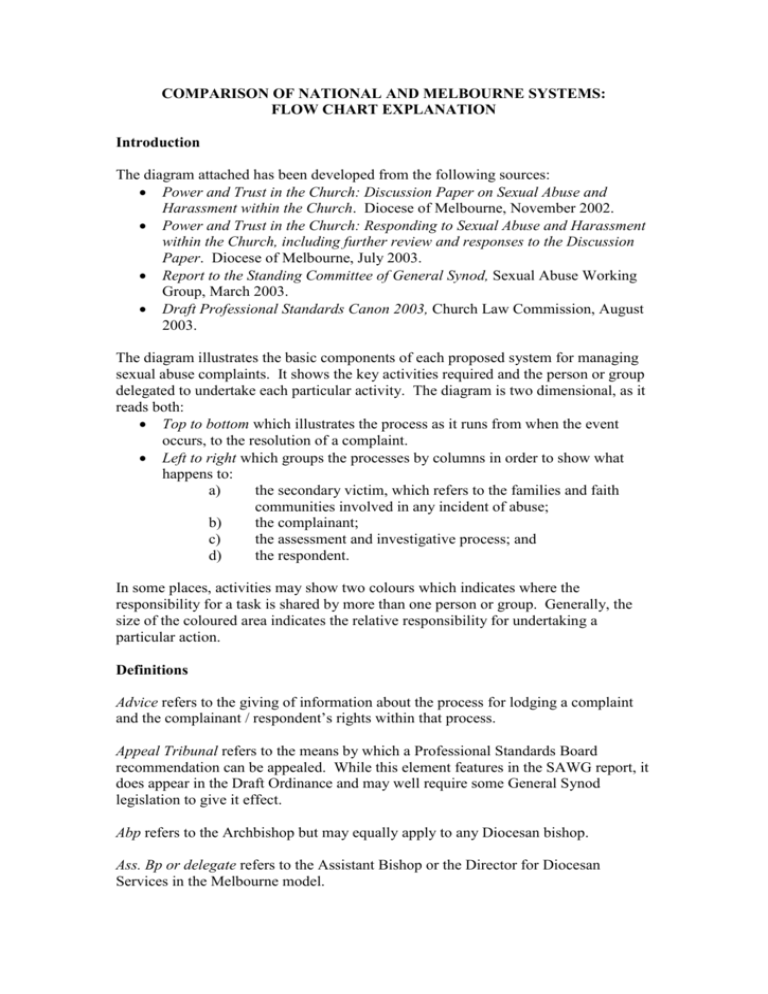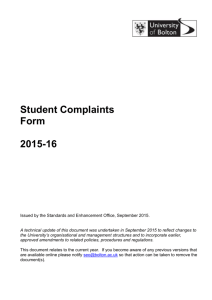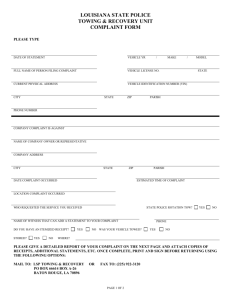
COMPARISON OF NATIONAL AND MELBOURNE SYSTEMS:
FLOW CHART EXPLANATION
Introduction
The diagram attached has been developed from the following sources:
Power and Trust in the Church: Discussion Paper on Sexual Abuse and
Harassment within the Church. Diocese of Melbourne, November 2002.
Power and Trust in the Church: Responding to Sexual Abuse and Harassment
within the Church, including further review and responses to the Discussion
Paper. Diocese of Melbourne, July 2003.
Report to the Standing Committee of General Synod, Sexual Abuse Working
Group, March 2003.
Draft Professional Standards Canon 2003, Church Law Commission, August
2003.
The diagram illustrates the basic components of each proposed system for managing
sexual abuse complaints. It shows the key activities required and the person or group
delegated to undertake each particular activity. The diagram is two dimensional, as it
reads both:
Top to bottom which illustrates the process as it runs from when the event
occurs, to the resolution of a complaint.
Left to right which groups the processes by columns in order to show what
happens to:
a)
the secondary victim, which refers to the families and faith
communities involved in any incident of abuse;
b)
the complainant;
c)
the assessment and investigative process; and
d)
the respondent.
In some places, activities may show two colours which indicates where the
responsibility for a task is shared by more than one person or group. Generally, the
size of the coloured area indicates the relative responsibility for undertaking a
particular action.
Definitions
Advice refers to the giving of information about the process for lodging a complaint
and the complainant / respondent’s rights within that process.
Appeal Tribunal refers to the means by which a Professional Standards Board
recommendation can be appealed. While this element features in the SAWG report, it
does appear in the Draft Ordinance and may well require some General Synod
legislation to give it effect.
Abp refers to the Archbishop but may equally apply to any Diocesan bishop.
Ass. Bp or delegate refers to the Assistant Bishop or the Director for Diocesan
Services in the Melbourne model.
Assessment refers to the decision whereby a complaint is judged whether it falls under
the protocol and the advice as to how it might be dealt should it not fall within the
protocol’s parameters.
Complaint received refers to written and signed statement detailing the abuse.
Conduct determination refers any penalties recommended that arise from an abuse
complaint. It can involve suspension, removal of a licence or deposition from orders.
Disclosure refers to any information disclosed about a complaint to a third party (i.e.
someone who is not directly involved in the complaint process). It would usually
occur at the process’s completion. While it includes record keeping in both systems,
the Melbourne proposal also covers the recording of names and allegations that do not
result in a complaint as well as the provision of confidential advice for recruitment or
appointment purposes. In the National Model it includes the Bishop’s disclosure of
reasons for not following the PSB’s recommendations.
DPS refers to the Director of Professional Standards.
End refers to the point at which the process for handling abuse complaints is
completed for each participant.
Event refers to the incident/s of abuse about which a complaint is made.
Findings refers to a decision about the particular merits of a complaint.
Investigation refers to any process of information collection beyond the initial
complaint.
Judgement / penalties refers to the enactment of penalties recommended in response
to an abuse complaint.
Legal Resolution refers to the process of litigation that may arise concerning a
complaint of abuse. It would involve insurers and legal counsel for both complainant
and the Church / Church worker. This process may preceed as well as follow a
investigation by Church authorities. It is placed here to highlight the reality that a
mediated settlement may not be possible.
Litigation Committee refers to the SAWG report’s suggestion of a group which
combines legal and insurance expertise to act on claims for compensation promptly.
Mandatory reporting refers to any legislative requirement whereby Church workers
are to inform State or Territory authorities of abuse, particularly in relation to
children.
Notification refers to the means by which an abusive event becomes known to Church
workers and authorities. It also refers to the process whereby a respondent is
informed that a complaint of abuse has been lodged.
Prelim Status Assessment refers to the preliminary assessment of ‘risk’ concerning a
respondent and might include their suspension from ministry until the complaint is
resolved.
Process Info refers to the means by which a complainant is informed about how their
complaint is being progressed.
PSB refers to the Professional Standards Board found only in the National Model.
PSC refers to the Professional Standards Committee, found in both the Melbourne and
National Models.
Psych. Counselling refers to the provision of support or psychological counselling
services.
Recommended Assessment refers to the recommendation to the Church authority
about whether a respondent should be suspended or prohibited from certain ministries.
This will often occur at the outset of an investigation according to the National Model.
It also refers to any recommendation forwarded to the Professional Standards Board
concerning examinable conduct.
Response to claim refers to the written response to a complaint about abuse. The
respondent prepares the response with the assistance of person indicated.
Response: Mediation/Resolution refers to the process of responding to a complainant
following an assessment and investigation of their abuse complaint. It might include a
mediated agreement or an apology.
Review refers to any need on the part of the Professional Standards Board to review a
particular complaint.
Strategy refers to the coordinated pastoral response required for secondary victims of
abuse.
Uncertain refers to those elements where details are unclear or otherwise absent from
the respective documentation.
Wayne Brighton
12 September 2003






